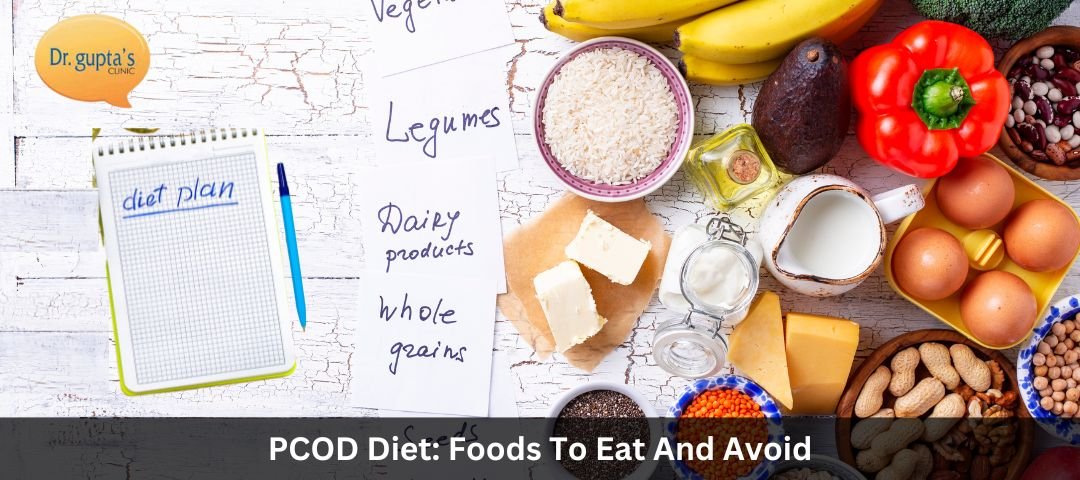Many immature or partly developed eggs are released by the ovaries as a result of polycystic ovarian disease (PCOD), which leads to cyst formation. Reduced symptom severity is a primary goal of PCOD diet and therapy. Indications of PCOD include painful or irregular periods, excessive facial hair, acne breakouts, pelvic soreness, difficulties becoming pregnant, and regions of thick, darker, velvety skin. Future effects of PCOD might include endometrial cancer, type 2 diabetes, morbid obesity, obstructive sleep apnea, cardiac difficulties, and psychological disorders.
The ovaries often generate androgens, which are male sex hormones, along with a tiny quantity of female sex hormones. These support the proper development of eggs in the ovaries throughout each menstrual cycle. A balance in these sex hormones is related to polycystic ovarian syndrome. PCOD causes the production of more androgens. This causes patients to cease ovulating, have acne, and grow too much face and body hair. A proper PCOD diet chart is very important for such patients.
Food To Consume In PCOD Diet
According to an investigation, food for PCOD patients has an enormous effect on symptoms of PCOD.
The majority of Indian food is made up of a balanced mixture of grains, legumes, beans, fruits, and vegetables, all of which are bursting with nutrients, including proteins, lipids, carbs, vitamins, and minerals. Spices and herbs, including ginger, garlic, cinnamon, turmeric, black pepper, cumin, saffron, and cloves, which are frequently used in cooking, also offer significant antioxidant defenses against a variety of illnesses and ailments.
An Indian PCOD diet chart that combines the aforementioned foods has a lot to offer persons with the condition. Losing weight while you have PCOD might be difficult, but if the proper diet and lifestyle are adopted while maintaining a calorie deficit, you can reach your ideal weight.
Regimens that can assist PCOD patients in managing their symptoms are listed below:
1. Fruits
As part of a PCOD diet chart for weight loss, fruits, including mangoes, bananas, plantains, apples, berries, guava, pineapple, papaya, melon, pomegranate, and guava are advised. Fruits are very nutrient-dense and high in fiber, and they can help sate cravings for sweets. The PCOD diet chart does not, however, advise going on a fruit diet all by yourself or consuming too much fruit at once. Although loaded with antioxidants, fiber, vitamins, and minerals, these fruits for PCOD also include varied quantities of carbs, which might raise blood sugar levels.
Because of this, it is typically advised that food for PCOD patients limit their fruit intake to a modest amount or a piece between meals. Fruits with skin are preferred over fruits without skin because they have a lower glycemic index (GI). Food will be absorbed more slowly, and the rise in blood sugar levels will be more gradual with a lower GI.
2. High Fiber Vegetables
The Indian dietary throughout PCOD ought to involve high-fiber products like broccoli, mustard greens, spinach, sweet potatoes, beans with greens, cauliflower, snake gourd, and carrots. By hindering metabolism in the human system while minimizing the digestive tract’s job stress, veggies packed with fiber have the potential to maintain glucose levels and eliminate diabetes-related complications. A minimum of 25 grams of fiber per day ought to theoretically be incorporated into the PCOD diet chart.
3. Pulses
A great supplement to the Indian vegetarian meal strategy for PCOD is legumes, including pea splits, green and yellow moong, dry beans like chana dal, lentils, soy products, and chickpeas. Pulses stabilize blood sugar levels since they are moderate glycemic foodstuffs.
4. Nuts And Seeds
As an excellent provider of nutritious fats and therapies for the PCOD diet chart, nuts and seeds such as almonds, hazelnuts, flaxseeds, pine nuts, and sesame seeds are strongly encouraged. It’s proposed that women consume 20 grams or less of nuts and seeds every single day as part of their PCOD Indian diet plan.
5. Protein
A significant portion of lean protein is required in the PCOD diet chart. In addition to promoting metabolism and digestion, protein is essential for the synthesis of hormones, including insulin, estrogen, and testosterone. Lean protein is, therefore, advantageous for controlling PCOD symptoms. Egg whites, skinless chicken, seafood including prawns, salmon, tuna, and cod, skimmed milk, curd, and tofu are all examples of lean protein sources. However, no more than two servings of milk and yogurt should be consumed daily.
6. Whole Grains
Great food for PCOD patients includes whole grains, including whole wheat, brown rice, buckwheat, quinoa, oats, poha, muesli, and barley. Unprocessed carbohydrates and fiber are abundant in whole grains. They also take longer to digest, which might aid blood sugar regulation.
7. Indian Spices And Herbs
Fenugreek, cinnamon, turmeric, mint, tulsi, basil, ginger, and cloves are some of the Indian herbs and spices that are effective in reducing the symptoms of PCOD in women and managing their insulin levels. Therefore, it is suggested that PCOD sufferers include these antioxidant herbs and spices in their diet to spice things up. Traditional Indian cuisine is bursting with nutritious grains, lentils, immune-strengthening components, and restorative spices and herbs. However, Indian cuisine has also developed to incorporate undesirable, nutrient-poor components like refined and processed flour, saturated fats, and sugar.
Diet To Avoid In PCOD
Traditional Indian cuisine is bursting with nutritious grains, lentils, immune-strengthening components, and restorative spices and herbs. But Indian cuisine has also developed to incorporate unhealthful, nutrient-poor components like refined and processed flour, saturated fats, and sugars. Many of these foods, especially when used in a PCOD weight-reduction plan, can exacerbate PCOD and should be absolutely avoided.
Food items to Avoid in the PCOD diet chart for weight loss:
1. Starchy Vegetables
Your PCOD diet chart ought to reduce the intake of carbohydrates from vegetables like sweet potato, yam, peas, corn, taro, and squash. Starchy greens are abundant in calories and can rapidly enhance bloodstream glucose concentrations in individuals, contributing to metabolic instability.
2. Vegetable Oil
In addition to their significant concentration of omega-6 fatty acids, veggie fats are deeply hydrogenated and potentially promote aggravation in PCOD-affected women. They are additionally related to diabetes, tumors, being overweight, and heart problems. Consequently, more nutritious alternatives like coconut oil, ghee, olive oil, or avocado oil ought to be integrated into the nutritional regimen for PCOD.
3. Loaded Sugar
Gulab jamun, kulfi, gajar ka halwa, cakes, biscuits, and Kheer are just a few of the delectable sweets available in India. The majority of these sweets are heavy in calories and sugar, which might have a negative effect on PCOD in women.
4. Fruit Canned Juices
The PCOD diet should not include fruit juices, canned fruit, or processed fruit concentrates because these foods are likely to be rich in added sugar. Fresh or frozen fruit should preferably be included in the Indian diet for PCOD since they include more healthful fibers and minerals.
5. Fried Food
Samosas, pakoras, and fritters are just a few fried foods that are rich in saturated and hydrogenated fats. These unhealthy fats are not recommended in the food for PCOD patients since they might increase the production of estrogen.
6. Alcohol And Caffeine
For PCOD-affected women, alcohol and caffeine might be harmful. While drinking alcohol raises the risk of developing liver disease, coffee can boost anxiety and release stress hormones, which can cause insulin levels to rise.
7. Refined Carbs
White bread, white rice, quick oatmeal, rice cakes, and white pasta are examples of refined and processed carbohydrates and items that should be removed from the PCOD diet list since they have lost all of their fiber and nutritional value.
8. Red Meats
Red foods, including pig, beef, and mutton, should be avoided by women with PCOD. These meals, which are heavy in cholesterol and saturated fats, can exacerbate hormonal issues that are already present. Additionally, processed meats have added preservatives and chemicals and are particularly rich in salt. These include salami, gammon, bacon, chorizo, and other items that shouldn’t be included in the PCOD diet plan.
9. Dairy Products
IGF-1, a hormone found in dairy, can mimic insulin in the body, spiking blood sugar levels and exacerbating PCOD symptoms in females. Additionally, common animal hormones and antibiotics may be added to typical dairy products. This may disrupt a woman’s hormonal balance and make it more challenging to control symptoms of PCOD.
Summary
PCOD is normally diagnosed by experts in reproductive health, but it also has a substantial impact on the body’s other systems, including the mind. If you have PCOD, you’ll probably need to interact with more than one type of healthcare provider to treat your symptoms holistically. Give adjustments time to take effect in terms of your PCOD diet chart. Be kind to your body and keep adjusting your eating habits as you pay attention to how they make you feel.
If you’re looking for a permanent solution to PCOD, consult our sexologist at Dr. Gupta’s Clinic for expert Ayurvedic fertility treatment in India. Understanding your primary PCOD issues, triggering foods, and appropriate replacements are all part of our PCOD management program’s goal of helping you cure the illness.
To book a consultation, contact us at:
Phone: +91-9831834215,
Mail: drguptasclinic@gmail.com
Related Blogs
How To Stop Masturbation In Men: Effective Ways To Overcome Masturbation Addiction
Are you in the habit of masturbating a lot? If yes, then you are on the right page! Masturbation is a natural and healthy aspect of human sexuality, contributing to sexual pleasure and overall sexual well-being. However, when it becomes an uncontrollable masturbation...
10 Effective Home Remedies For Vaginal Discharge
Many women have white discharge, also known as leucorrhoea, which is an issue that usually affects young girls of school age. This discharge problem occurs at a certain time period of the menstrual cycle. Girls and women shouldn't worry because the amount of white...
Maintaining Healthy Old Age Sexuality: Tips For Sexual Well-being
Sexuality is an essential aspect of human life, and it doesn't fade as we age. While the physical aspects of intimacy may change, but the emotional and psychological dimensions of sexuality continue to be important throughout our lives. To help you understand the...




